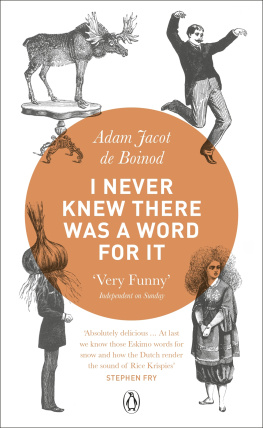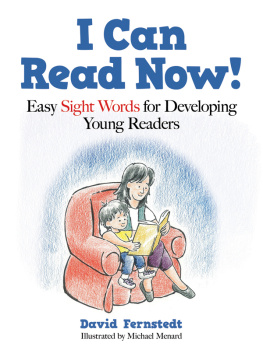By the Same Author
The Meaning of Tingo
Toujours
Tingo

Illustrations: Sandra Howgate
ALLEN LANE
an imprint of
PENGUIN BOOKS
PENGUIN BOOKS
Published by the Penguin Group
Penguin Books Ltd, 80 Strand, London WC2R 0RL , England
Penguin Group (USA) Inc., 375 Hudson Street, New York, New York 10014, USA
Penguin Group (Canada), 90 Eglinton Avenue East, Suite 700, Toronto, Ontario,
Canada M4P 2Y3 (a division of Pearson Penguin Canada Inc.)
Penguin Ireland, 25 St Stephens Green, Dublin 2, Ireland
(a division of Penguin Books Ltd)
Penguin Group (Australia), 250 Camberwell Road. Camberwell,
Victoria 3124, Australia (a division of Pearson Australia Group Pty Ltd)
Penguin Books India Pvt Ltd, 11 Community Centre,
Panchsheel Park, New Delhi 110 017, India
Penguin Group (NZ), 67 Apollo Drive, Rosedale, North Shore 0632,
New Zealand (a division of Pearson New Zealand Ltd)
Penguin Books (South Africa) (Pty) Ltd, 24 Sturdee Avenue,
Rosebank, Johannesburg 2196, South Africa
Penguin Books Ltd, Registered Offices: 80 Strand, London WC2R 0RL, England
www.penguin.com
First published 2007
Copyright Adam Jacot de Boinod, 2007
Illustrations copyright Sandra Howgate
The moral right of the author has been asserted
All rights reserved
Without limiting the rights under copyright reserved above, no part of this publication may be reproduced, stored in or introduced into a retrieval system, or transmitted, in any form or by any means (electronic, mechanical, photocopying, recording or otherwise), without the prior written permission of both the copyright owner and the above publisher of this book
A CIP catalogue record for this book is available from the British Library
ISBN: 978-0-14-191919-5
In memory of my father
Contents
Foreword
The reception given to my first book, The Meaning of Tingo, was very heartening, and encouraged me to continue to explore the wilder hinterlands of the worlds more unusual words and expressions. I am glad to say my first foray was by no means exhaustive. Looking further into some of the more common languages I found such delights as okuri-okami, the Japanese word for a man who feigns thoughtfulness by offering to see a girl home only to try to molest her once he gets in the door (literally, a see-you-home wolf); kaelling, the Danish for a woman who stands on the steps of her house yelling obscenities at her kids; and belochnik, the Russian for a thief specializing in stealing linen off clothes lines (an activity that was supposedly very lucrative in the early 1980s).
And how could I have missed the German Kiebitz, an onlooker at a card game who interferes with unwanted advice or the Portuguese pesamenteiro, one who habitually joins groups of mourners at the home of a deceased person, ostensibly to offer condolences but in reality to partake of the refreshments which he expects will be served?
In this second volume Ive ventured too into over a hundred new languages with African and Native American tongues scoring high with the surprising and delightful definitions. The Ndebele of Southern Africa have the word dii-koyna, meaning to destroy ones own property in anger, an impulse surely felt by most of us at some time or another, if not acted upon. From the Bakweri language of Cameroon we have wo-mba, a charming word to describe the smiling in sleep by children; and from the Buli language of Ghana the verb pelinti, to move very hot food around inside ones mouth to avoid too close a contact. And doubtless there are many among us who have found themselves disturbed by a butika roka (Gilbertese, Oceania), a brother-in-law coming around too often.
Once again, of course, many of the more unusual words relate closely to the local specifics of their cultures. Most of us are unlikely to need the verb sendula (from the Mambwe of Zambia), meaning to find accidentally a dead animal in the forest, which carries with it the secondary sense and be excited at the thought that a lion or leopard could still be around; the bizarre noun mmbwe, from the Venda of South Africa, which describes a round pebble taken from a crocodiles stomach and swallowed by a chief (which can hardly be an everyday occurrence); or the wonderful and unlikely biritululo, from the Kiriwani of Papua New Guinea, meaning comparing yams to settle a dispute. But even if we never have the call to use such expressions, its surely enriching to know that in Malay pisan zapra is the time needed to eat a banana; in Finnish, poronkusema is the distance equal to how far a reindeer can travel without a comfort break; while manntsona, from the Malagasy of Madagascar, is to smell or sniff before entering a house, as a dog does.
We may not share the same climate, but we can all too easily imagine the use of words like hanyauku (Rukwangali, Namibia), to walk on tiptoe on warm sand, barbaran-on (Ik, Nilo-Saharan), to sit in a group of people warming up in the morning sun, or dynke (Norwegian), the act of dunking somebodys face in snow.
Despite our differing circumstances, the words once again reveal that the commonality of human experience remains strong. Most of us know a poyipoyi (Tsonga, South Africa), a person who talks at length but does not make sense, or a mutakarrim (Persian), one who makes pretensions to generosity, if not a kanjus makkhichus (Hindi), a person so miserly that if a fly falls into his cup of tea, hell fish it out and suck it dry before throwing it away. And weve surely all observed in our friends and colleagues chovochovo (Luvale, Zambia), the tendency to carry on talking after others have stopped, not to mention napleiten (Dutch), to discuss might-have-been, go over old ground again, keep on arguing after a thing has been decided. And anyone whos ever tried to manage people will have tried digdig (Manobo, Philippines), to praise someone for the quality he lacks in order to encourage him to develop that quality.
There must be buses on every route in the world where one can spot a tyovka (Czech), a woman who hangs on to the pole next to the bus driver and chats him up. On Wall Street, American financiers would understand the verb iwaktehda, from the Dakotan language of one of their own native peoples, meaning to go home in triumph having taken scalps. And even in the most sophisticated societies there will be plenty who have, at one time or another, experienced the equivalent of the Tsongan rhwe, to sleep on the floor without a mat and usually drunk and naked.
Half as long again as The Meaning of Tingo, this second bite into the substantial cherry of world languages has allowed me to venture in depth into all sorts of new areas. There are more examples of false friends, from the Czech word host, which confusingly means guest, to the Estonian sober, a perhaps unlikely word for a male friend. There are the intriguing meanings of the names of cities and countries, palindromes and even national anthems, as well as a series of worldwide idioms, which join the words in confirming that the challenges, joys and disappointments of human existence are all too similar around the globe. The admonitory Dont count your chickens of English, for example, is echoed in most languages, becoming, in Danish,
Next page








